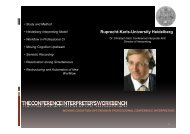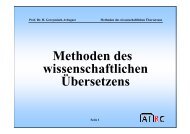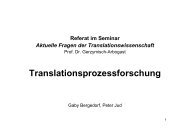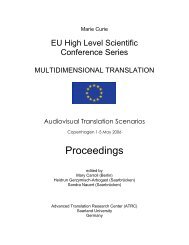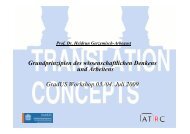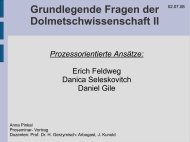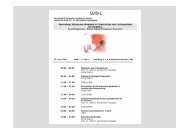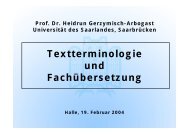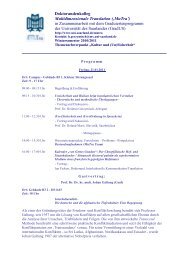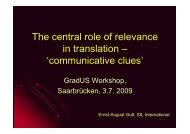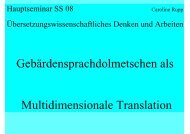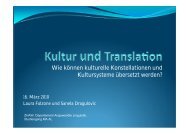Proceedings - Translation Concepts
Proceedings - Translation Concepts
Proceedings - Translation Concepts
You also want an ePaper? Increase the reach of your titles
YUMPU automatically turns print PDFs into web optimized ePapers that Google loves.
MuTra 2005 – Challenges of Multidimensional <strong>Translation</strong>: Conference <strong>Proceedings</strong><br />
Gertrud Hofer<br />
progress or planned. Far more court interpreters would like to attend these courses than have<br />
had the opportunity to do so. Within the next two years, all court interpreters in the Canton of<br />
Zurich should have had the chance to attend a basic course.<br />
3.5 Outcome of the basic course<br />
When the three pilot courses were first advertised there was an enormous response. Most of<br />
the court interpreters not only needed (further) professional training, they also wanted to learn<br />
more about interpreting. About 300 applicants responded immediately, yet for pedagogical<br />
reasons we started with only 52 participants.<br />
In addition to the aims of the course outlined in 3.4, we found it necessary to react to several<br />
misconceptions about interpreting mentioned by the pilot course participants such as:<br />
• being allowed to ask questions at court or in police offices if they do not understand<br />
• being in the position to offer legal explanations or even advice<br />
• judging their own capabilities.<br />
Because of the great interest in the pilot courses the Interpreting Group decided to offer the<br />
educational program on a regular basis and continue to subsidize it. The basic course has been<br />
compulsory for new applicants since April 2004 and will become so for all court interpreters<br />
by the end of 2006. The courses and exams are thus being used as a selection instrument for<br />
court interpreters in the Canton of Zurich. Although the basic course is not yet compulsory,<br />
almost one-third of all court interpreters had already enrolled in the program by July 2005.<br />
The huge increase in applications surprised both institutions (the Interpreting Group and<br />
ZHW Center for Continuing Education): obviously the training program meets a deficit<br />
experienced by a majority of court interpreters. By July 2005, eleven courses had been<br />
offered, with a total of 198 participants.<br />
Of the 171 candidates who have taken the exams to date, 125 (73%) passed. Although<br />
the basic course is only two days long and the evaluation of the exams still has a preliminary<br />
character, they make it apparent whether candidates have acquired the specialized knowledge,<br />
whether their competence in German actually corresponds to C2 when interpreting, and<br />
whether they have analytical competence and a gift for interpreting.<br />
Interpreters who successfully pass the exams receive more commissions from<br />
authorities and courts after their qualification, and those who fail the exams are suspended or<br />
excluded from the register. Some others decide to remove their names from the register even<br />
before they attempt the exam. The heterogeneity among course participants, a well-known<br />
problem of most courses offered by centers of continuing education, has the advantage here<br />
that interpreters can compare their competence and performance with other members in the<br />
course; in the process some realize that they had underestimated the interpreting profession<br />
and that interpreting is more than just speaking two languages.<br />
Somewhat to our surprise, the tightening of requirements does not necessarily lead to<br />
fewer court interpreters on the register but, because of the steadily rising number of<br />
applications, to better trained, more efficient ones. The training programs in the Canton of<br />
Zurich also benefit court interpreters from other cantons as well as interpreters active in other<br />
fields, above all in medicine and education. Interest from interpreters in other parts of<br />
Switzerland and other fields may be a possible explanation for the increase in applications.<br />
169



